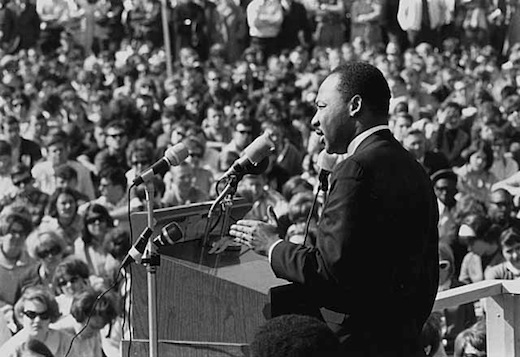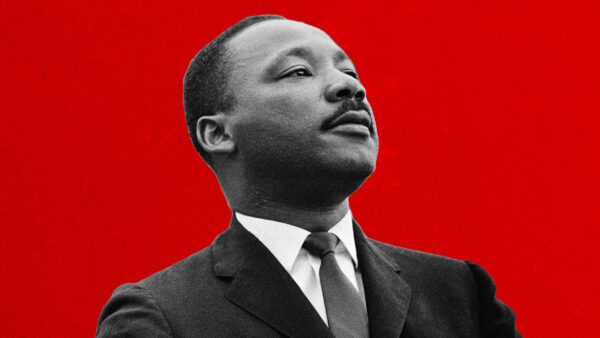Read More Breaking Marketing News
Maverick's Morning Thoughts
The Marketing System of Dr. Martin Luther King Jr.

Dr. Martin Luther King Jr. is a name synonymous with the civil rights movement.
He wasn't just a leader with a profound message, but also a master strategist in the realm of public perception and influence.
Today, on his birthday--he would've been 95--it's fitting to understand: what was Dr. King's marketing system?
There were lots of minsters preaching peace back then, so how did Dr. King standout, become popular, and be forever remembered as one of the greatest Civil Rights Leaders of all-time?
For one, Dr. Martin Luther King Jr. (MLK) was more than a civil rights leader; he was a master strategist on the road to change.
His journey began on the humble stages of local churches, not just as places of worship, but as community hubs where he could connect with the hearts and minds of everyday people.
These churches became his launching pads, where he mobilized support and shared his message of hope and equality.
His breakout moment came with the Montgomery Bus Boycott in 1955, a pivotal event that thrust him into the national spotlight.
Here, Dr. King demonstrated an extraordinary ability to organize and inspire mass participation in a peaceful protest, catching the eye of key figures who sought a leader with his unique qualities.
As a founding member and the driving force behind the Southern Christian Leadership Conference (SCLC), King didn't just focus on one town or city; he aimed to unite the South's local movements under one banner, creating a powerful synergy that echoed across the nation.
Understanding the era's media landscape, Dr. King masterfully used it to his advantage, turning local struggles into national conversations.
He wasn't just fighting battles in the streets; he was winning hearts and minds across America through newspapers, radios, and televisions.

Dr. Martin Luther King Jr.'s top accomplishments include receiving the Nobel Peace Prize in 1964 for his nonviolent fight against racial discrimination, leading the successful Montgomery Bus Boycott from 1955-1956, and delivering the iconic "I Have a Dream" speech during the 1963 March on Washington, which became a defining moment in the Civil Rights Movement.
Dr. King's steadfast commitment to nonviolence set him apart in a time when many called for more aggressive tactics. This approach won him a diverse and widespread following, proving that strength doesn't always come from confrontation but often from the power of unity and peace.
Beyond just leading, King was a unifier and a builder.
He forged coalitions with various groups, pooling resources and amplifying the reach of the civil rights movement.
His ability to organize marches, boycotts, and demonstrations showcased his knack for rallying people from all walks of life, cementing his leadership and influence in and outside of the movement.
While other leaders focused on direct action or policy change, Dr. King combined these with an appeal to moral and ethical values.
He positioned the civil rights struggle within a broader context of justice and human dignity, appealing not only to oppressed communities but also to the conscience of the nation.
But perhaps King's most enduring legacy lies in his message, one that transcended race and geography, speaking to the universal human desires for justice and equality. His iconic "I Have a Dream" speech wasn't just a call for change; it was a vivid vision of a future filled with hope, a dream he turned into a shared aspiration for millions. A marketing message so driven with value that it went viral.
Dr. King's marketing ensured his lasting legacy through consistent messaging and a clear vision.
His "I Have a Dream" speech is a testament to this – a masterclass in branding a movement. He didn't just speak of change; he painted a vivid picture of a possible future, making his dream a shared vision for the masses.
While Malcolm X advocated for resistance, Dr. King championed the cause of peace, positioning himself as a compelling alternative and a beacon of hope for those turned off by the fiery rhetoric of Malcolm X. His approach offered a sanctuary of nonviolence and reconciliation in a turbulent era, resonating with those seeking a more harmonious path to change.
Dr. Martin Luther King Jr.'s approach to marketing was revolutionary, and it reminds me of a quote from managing expert Peter Drucker: "great marketing is leadership."
After all, great leaders get noticed, get followed, and get huge movements behind them. That's how great marketing is done. Amazon didn't advertise, they led the charge to the perfect online retailer.
Dr. King used his organizational skills, message and storytelling to lead, generate change and win.
On April 4, 1968, James Earl Ray killed Dr. King because he was a loser and hated winners. Today, MLK is remembered as a winner, and Ray is remembered as a loser. That's not coincidence, that's marketing.
As marketers and strategists, there's much to learn from Dr. King's methods – the power of a compelling, emotional narrative, the importance of leadership, and the need for a consistent, value-driven message. Happy Birthday, Dr. King!
To your success!

DOMINATE and WIN with MAVERICK
Learn how to use marketing to get whatever you want.